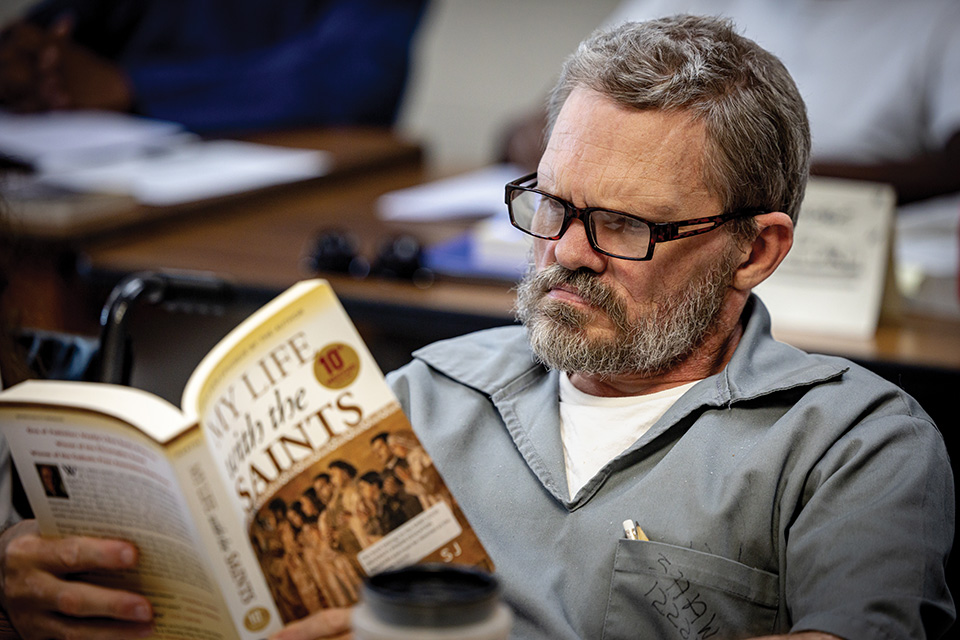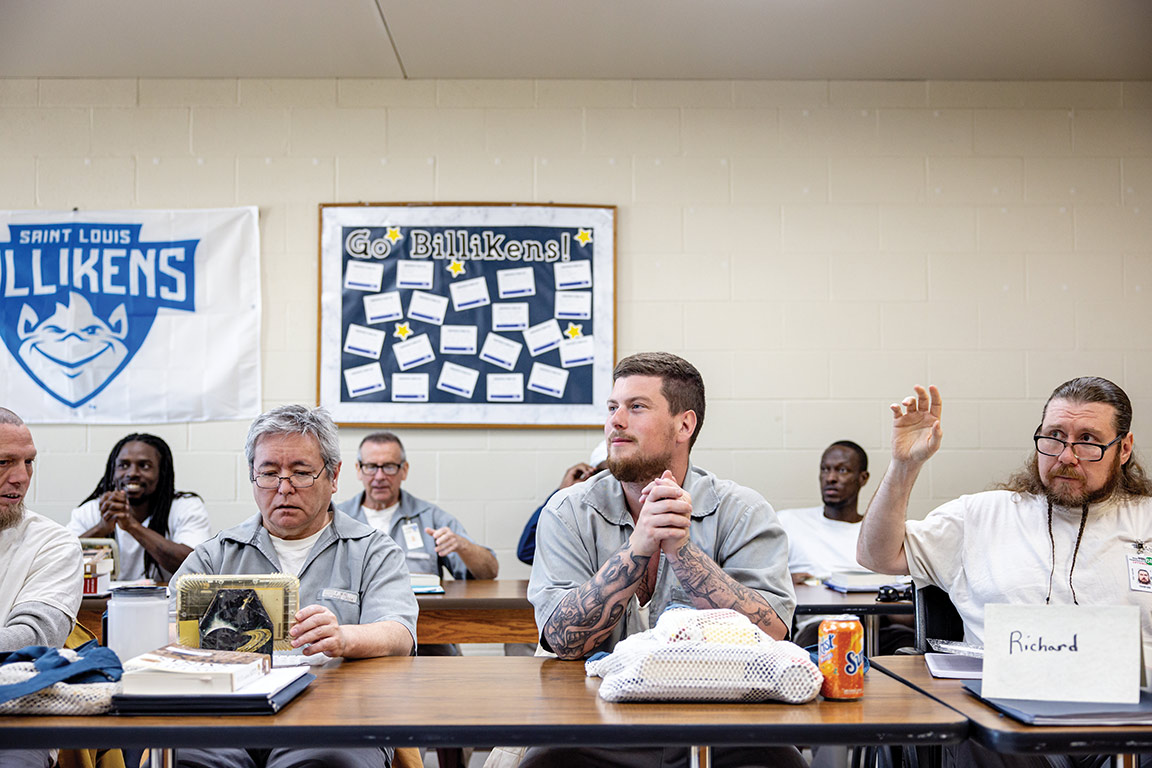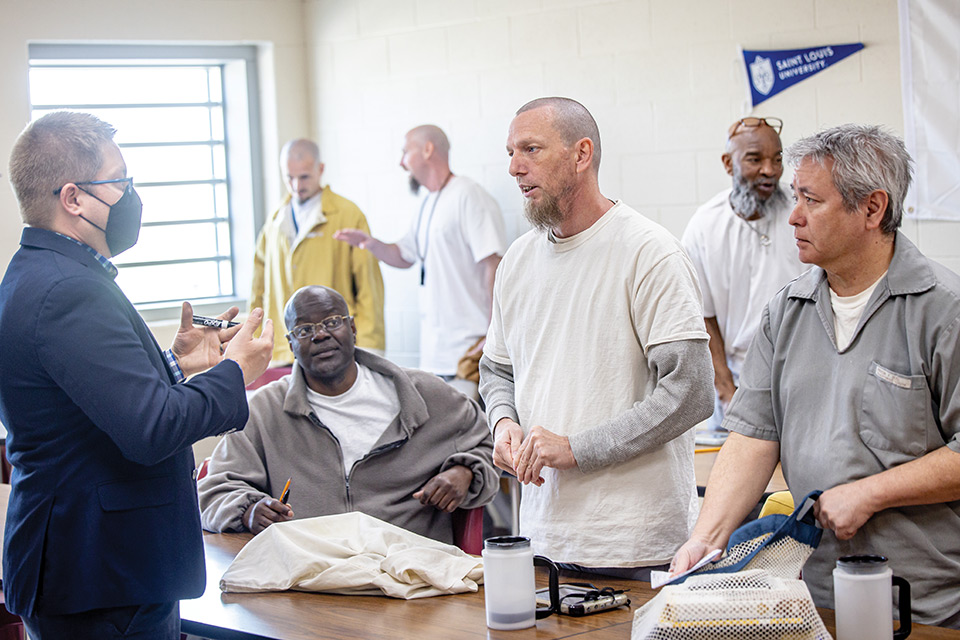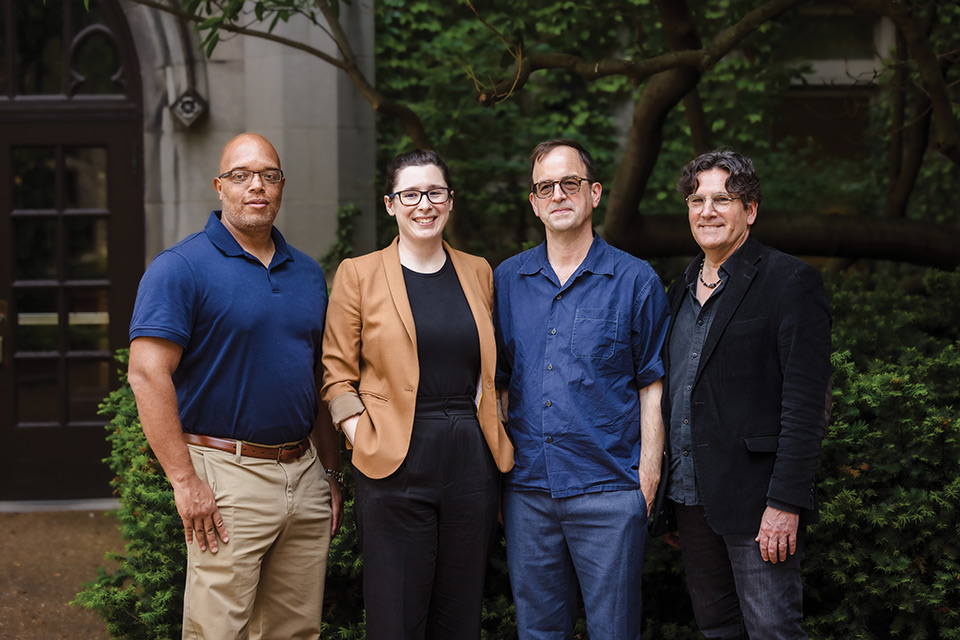Minds Unconfined
Saint Louis University’s Prison Education Program opens minds and changes lives within the confines of the correctional facility.
In many ways, this “Intro to Theology” class could be anywhere on the Saint Louis University campus.
At the front of the classroom, the professor leads a discussion on Ignatian spirituality, pausing to write key points on the board. Twenty or so students sit shoulder-to-shoulder at long tables, listening, taking notes, asking questions. On the walls hang inspirational messages, SLU pennants and a Billiken flag.
But this class is decidedly different. This classroom is behind lock and key — nine locked doors and gates, to be exact, from the front of the facility. And these students are incarcerated here, at the Eastern Reception, Diagnostic and Correctional Center in Bonne Terre, Missouri.
They are incarcerated, and they are Billikens. They constitute the most recent cohort of SLU’s Prison Education Program (PEP), which is celebrating its 15th anniversary this year.
Fifteen years ago, Courtney Everett was on the inside, serving a 22-year sentence at the ERDCC in Bonne Terre. He knew the routine and monotony of prison life. He tried to stay out of trouble and take advantage of the limited opportunities in the facility. But mostly, he said, he “tried not to die” there.
To an outsider, the ERDCC might look surprisingly innocuous. It’s made up of nondescript cinderblock buildings with well-kept green spaces in between. Lines of men in gray garb walk without restraint from one place to the next.
But the place possesses a powerful gravity. A mixed-security prison, the ERDCC houses as many as 2,700 people. Razor wire tops every fence. An airlocked hall separates the outside world from the inside. Next to the visitor center sits Missouri’s lethal-injection chamber.
One Sunday evening in 2007, Everett (A&S ’15) was watching television in his cell when a segment on 60 Minutes caught his attention. The weekly news show spotlighted a prisoner education program at Bard College.
The concept of college in prison was unpopular but not unheard of in the early 2000s. For decades, the government had allowed inmates to apply for Pell Grants to pursue degrees, but that support ended in the mid-1990s amid political pressure. By 1997, only eight programs remained in the country, down from 350 in 1982.
Everett didn’t think much about the Bard program in the moment — but he remembered it later when he met Dr. Kenneth Parker, then a professor of theology at SLU.
Parker had seen the same 60 Minutes episode and realized that such a program would fit perfectly with the tenets of Jesuit education — preparing men and women for and with others, finding God in all things and places. He was inspired to create what was initially called the SLU Prison Initiative.
“I saw the segment and didn’t think twice,” Everett said. “He saw something on TV and made it real.”

In 2008, Parker started holding weekly theological studies classes at the ERDCC. For the initial group of students — and for every group that followed — interest was substantial: 300 people applied for 15 spots.
Participants could work toward a certificate in theological studies from SLU. In 2010, a dozen students completed the program.
Faculty and staff soon realized that another group could benefit: prison staff, most of whom come from communities without much access to higher education.
With the encouragement of the Missouri Department of Corrections, the SLU program expanded and became the first of its kind, offering an on-site, fully accredited Associate of Arts degree program to both incarcerated people and prison employees. The two populations would take classes separately but work toward the same degree.
That was in 2011, around when Julie O’Heir (A&S ’06) started at the PEP. For more than a decade, O’Heir was the only staff member alongside volunteer faculty administrators. In 2021, she became the director of the program and hired two support staff.
One was Everett, who had recently been released from the correctional system — and who had been part of the first Associate of Arts cohort.
Before his incarceration, Everett earned an associate’s degree in accounting, so he had experience with higher education. He welcomed another chance to escape the boredom of prison life.
“I had been there for five or six years at that point. I had done everything available — self-help, anger management, criminal-thinking-based programs — but nothing college-related,” Everett said. “It was a chance to get a piece of paper from SLU that would make me look good, maybe alleviate the stigma of being in prison.”
The program turned out to be so much more than that. Everett found himself in a community, one that included the professor. He was surprised that questions were welcome in that first class and in each to follow. In his life before, questioning signaled disrespect. Now, Parker good-naturedly nicknamed him the “Doubting Thomas” of the class.
“It was my introduction to mission-centered education versus my experience, which had just been technical, sterile: Come to class, do the work, get the grade, go,” Everett said. “This was more relationship-building, and that was new for me.”
The cohort earned the associate’s degree in about four and a half years. They took one course at a time: a four-hour class weekly for nine weeks, five terms per year.
“It’s a long class period,” Dr. Bonnie Wilson (CSB ’91, A&S ’92), associate professor of economics, said. “But you work with what you can with the facility.”
Requirements are tailored to the compressed format, but the expectations are the same as comparable SLU courses. Lots of discussion in class and lots of writing outside of class. For the most part, students seem well-suited to both.
Keith (A&S ’21), an incarcerated person whose surname is withheld to protect his privacy, is a PEP teaching assistant. He said students come to him for help writing papers, but they’re usually more competent than they think.
“People were writing 20-, 30-page letters to their families every week. By hand. They’re naturals at writing,” he said. “I help them realize that what they were doing is what the professor is asking for, just in a different format.”
Life experience enriches the in-class experience, too.
“You’re teaching people who’ve had a much broader range of experiences than your typical student coming to SLU at 18 years old,” said Dr. Scott Berman, associate professor of philosophy. “The discussions are varied and broad, and involve serious, weighty topics.”
While any incarcerated individual has life experience to draw on, some aren’t prepared to do college-level work. In 2016, the PEP began offering non-credit classes to prepare students for college in the future. This program currently runs at the ERDCC and the St. Louis County Jail in Clayton, Missouri.
Individuals in the College Prep Program take three to five courses annually in one of four areas: communication and technology, community and society, creative expression, and well-being.
The goal is to develop the collaborative learning, study and research skills needed in a college setting. Students might advance to the PEP’s Associate of Arts degree program or plan to enter college upon release.
As any traditional student knows, there’s more to college than the classroom. The PEP offers more to its students, too. The Inside Out Alliance (IOA) is the program’s student organization, which meets monthly and provides service to others at the Bonne Terre facility.
“Because of the IOA, lots of folks at Bonne Terre got tutoring and got their GEDs,” Wilson, the IOA’s faculty advisor, said. “It is clearly important to our students to help others in their education.”
Another component of a college experience is the enriching, campus-wide events. To translate that to the prison environment, the PEP started the Prison Arts and Education Program, which offers humanities-based workshops and the Inside Out Speaker Series.
Dr. Devin Johnston, professor of English, coordinates the program. He draws on the University community as well as his connections in the arts world to bring to the prison everyone from award-winning poets to indie musicians to the Chamber Music Society of St. Louis.
“It almost doesn’t matter the subject; we invite people who demonstrate excellence and passion,” he said. “But we also want to provide a public space for intellectual conversation.”
Programming is open to the entire prison community, but the audience tends to be mostly incarcerated people, who started a reading group so they could be prepared to converse with the visitors. And the ERDCC’s media center, which incarcerated people run, records and edits the performances to share on the facility’s closed-circuit television.
“Universities should be resources that radiate outward into their communities,” Johnston said. “That’s ideally what we do here.”
His work with the program is “the richest experience I’ve had in a job I already really enjoy,” he said. It’s a sentiment echoed by other PEP faculty.
Berman has been in SLU’s philosophy department for more than three decades. As the PEP’s academic coordinator, he recruits other faculty to the program. The ones who accept report that teaching in prison is one of their best teaching experiences.
It certainly was profound for Wilson.
“I get choked up thinking about it. When you leave after that last class, you realize — I do not have permission to see these people again,” she said. “For me, walking out on the last day was far more striking than walking in on the first.”
She loved teaching economics to the second Associate of Arts cohort.
“These students are mindful of the potential for their experience, ending in a degree, to have an impact on their material lives, just like our St. Louis students,” Wilson said. “But I think what’s more true for our Bonne Terre students is the intrinsic value of the experience, of developing a life of the mind. It is enlivening for faculty, and you bring that back to the St. Louis campus.”
Keith said Wilson’s economics class was life-changing.
“It made 20 unique individuals become one cohort,” he said. “And that was the greatest experience, honestly, of my life — being able to connect with a bunch of people I never would have connected with otherwise.”
O’Heir confirmed his sentiments.
“Our approach helps students see themselves as part of a community. They go on to participate more in the community inside the prison and to consider what their participation will look like when they’re on the outside,” she said.
All of the work — learning the material and also building self-awareness and a sense of belonging to something bigger than oneself — makes all the difference in the kind of future these students can have.
O’Heir said that more than 95% of all incarcerated people in the United States will return to the outside community. Offering them the chance to receive a high-quality education benefits everyone.
Statistically, incarcerated individuals who participate in post-secondary education are far less likely to return to prison after being released. They’re more likely to find employment and have access to higher-paying jobs. They realize the value of education and encourage family and friends to pursue their own, which can promote generational change.
“Most of these students never got even a first chance at a good education. They see this as an amazing opportunity. And they’re not going to let it fall through their fingers,” Berman said.
Of the 14 PEP alumni who have been released from prison, all are employed, pursuing further education or both. All of them remain out of prison.
When Everett was released in June 2021, he was “scared to death.” He didn’t know how he would make a life beyond prison. Before being hired by SLU, he applied for jobs but found it difficult to get past background checks. He worked for the Salvation Army for six months before the PEP position became available.
As PEP coordinator, one of his duties is to help others during that transition. He advises program alumni about navigating life on the outside, including resources for counseling and further education. Everett himself is enrolled in SLU’s MBA program, and three of his fellow alums are applying to continue at SLU, now that they’re released.
Since the Associate of Arts program started, two cohorts have graduated, in 2015 and 2020-21. Last year, 20 more incarcerated students enrolled in the third cohort, and a new group of Department of Corrections employees will begin this fall.
After the third cohort finishes, the PEP plans to launch a Bachelor of Liberal Arts in 2026. The program also wants to expand reentry support and provide funding for alumni to complete degrees on campus.
In October, the Prison Education Program will celebrate its 15th anniversary with an exhibit at Pius XII Memorial Library and symposiums in St. Louis and Bonne Terre. The program also will host the inaugural meeting of the Jesuit Prison Education Network to inspire people at other universities to start and sustain similar programs.
The SLU Prison Education Program is free to students. The program welcomes donor support. To make a gift, call 314-977-2849 or visit Prison Program Giftform.
4,500 participants (across all programs)
103 SLU courses
35 college-prep classes
140+ Inside Out Speaker Series events
44 Associate of Arts degree graduates
14 alumni released from prison
0% recidivism rate
About Universitas
Universitas, the award-winning alumni magazine of Saint Louis University, is distributed to SLU alumni, parents and benefactors around the world. The magazine includes campus news, feature stories, alumni profiles and class notes, and has a circulation of 132,438.




















